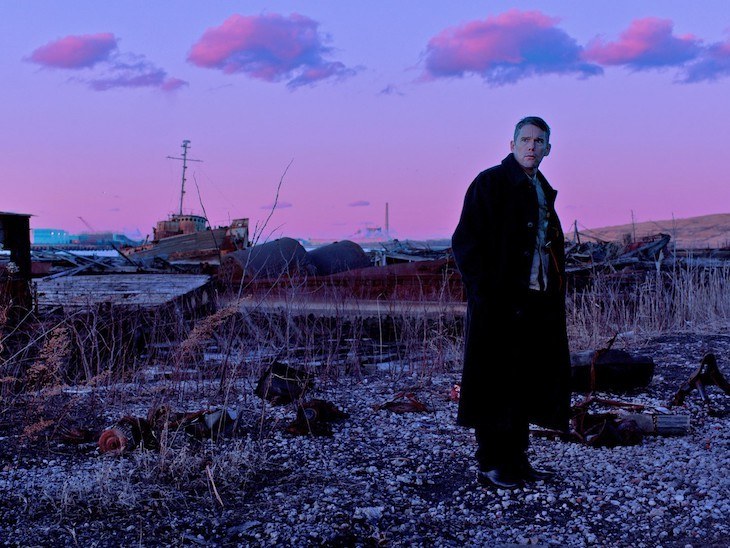‘That was some weird shit,’ George W. Bush is said to have muttered after Donald Trump’s desolate inauguration speech of January 2017.
‘I couldn’t have agreed more,’ wrote Hillary Clinton in What Happened.
Americans cannot agree on what has happened to their country, other than that everything has gone wrong. Is it ‘white supremacy’ and patriarchy, or the collapse of the white working class and the decay of patriotism? The symptoms too are polarized, beyond mutual comprehension. The leading cause of young black male deaths is murder, but the leading cause of young white male deaths is suicide. The weirdness of these linked statistics has a common source. The leaders of America couldn’t have agreed more with each other when it came to neglecting their responsibilities to the voters.
In 1976, Paul Schrader’s script for Taxi Driver traced the blowback of foreign policy failure in Vietnam. Schrader’s new film, First Reformed, does much the same for the human and environmental failures of industrial policy. Like Travis Bickle, the Reverend Ernst Toller is adrift and full of anger. Like Bickle, Toller invents a narrative of heroism; having lost his faith in prayer, Toller reads Thomas Merton and keeps a spiritual diary. And, like Bickle, Toller also sees redemption in the form of a vulnerable young blonde, plots the killing of a prominent politicians, and turns his violence first outwards and then inwards.
The difference is that Bickle is alienated, but Toller is atomised. Bickle shoots Sport the pimp, then tries to shoot himself. Failing, he is redeemed as a hero. Toller, however, fails to achieve catharsis by externalising his violence, and must confront the despair that he calls ‘the blackness’. It is this hopelessness, and the complementary torment of redemption, that makes First Reformed a Taxi Driver for the age of Donald Trump.
Ethan Hawke, the man who left Uma Thurman, plays Toller, a man who has lost his faith and his flock, with agonised remorse. Toller is the pastor of a Dutch Reform church at Snowbridge in upstate New York. The church, founded in 1767, is older than the Union; its otherwise pristine white woodwork carries a couple of bullet holes from the ‘Snowbridge Skirmish’. But First Reformed has lost its battle. The church is dying inwardly. First Reformed survives on charitable assistance from the Church of Abundant Life, its 5000-seat evangelical neighbour. Over at Abundant Life, chubby, cheery Pastor Jeffors (Cedric Kyles) has a gospel band and a television studio sponsored by a local industrialist. At First Reformed, the pews are empty, the organ is broken and the pipes in the gentlemen’s lavatory are leaking.
Toller is in worse shape. A scion of line of military chaplains, he encouraged his son to enlist for the Iraq War. His son was killed, sacrificed without purpose to ‘a war that had no moral justification’. Toller’s wife has left him, and he has left the Army. He is a solitary alcoholic. There is blood in his urine, and barely ten people in his church on Sunday morning. He grasps at a flicker of purpose when Mary (Amanda Seyfried) asks him to counsel her boyfriend Michael (Philip Ettinger).
Mary is five months pregnant. Michael, who has just come out of jail for overzealous environmental ‘activism’, wants her to have an abortion. The world, he tells Toller, is dying, and would be wrong to bring a child into it: ‘The social structure can’t bear the strain of multiple crises.’ Michael works part-time at Home Depot—the kind of job that lowers the unemployment figures without creating an economic basis for families and communities. To hasten the end of the world, he has prepared an explosive vest.
‘Calvinism rushes to be Unitarianism, and Unitarianism rushes to be Naturalism,’ wrote Emerson. The environmentalists have revived the apocalypse in naturalist form, and await the Rapture of death by pollution. The evangelicals have reaffirmed the American promise of material wealth through spiritual riches; Cedric Kyles, better known as the comedian Cedric the Entertainer, hints that Pastor Jeffers, with a booming church and a rich patron, can afford to be generous. But First Reformed has lost the conviction of its Calvinist roots. Worse, like the Mainline denominations, it has failed to gain from its twentieth-century pursuit of the Social Gospel. ‘If only I could pray,’ Toller writes. But his soul, like the social structure around First Reformed, is hopelessly cracked.
Alexander Dynan’s cinematography is almost Manichaean. Everything is black or white, elect or saved, as in a dream of meaning. But Schrader, who grew up in a strict Calvinist community, is also the author of Transcendental Style in Film (1972). Touches of bronze and gold reveal hints of transcendence, or at least truth, just as they did for the pioneers of spiritual naturalism like Emerson: the brass pin at the rear of Toller’s dog collar, the tumble of Mary’s long hair, the hickory hue of the whiskey bottle, the brown sludge in the lavatory bowl. These promises, though, sicken towards pink—a slug of Pepto-Bismol suppurates in a glass of whiskey—and then red: in the stripes on the flag, and the blood on the snow after Michael has blown his head off.
Mary scatters Michael’s ashes into a poisoned lake from a plastic bag, while the Abundant Life youth choir sing a Neil Young dirge. Forced into contact with life by his desire for Mary, Toller is radicalized, environmentally and spiritually. ‘Will God forgive us?’ he asks. Jeffers advises Toller against speculation, and to work on saving those around him, or, if he insists on the Social Gospel, to ‘go to Nicaragua and build houses’. Toller stays and, like Travis Bickle, tries to redeem himself through violence. His failure is a kind of epitaph for his church and his society.
First Reformed is a beautifully composed image of spiritual and social despair, a profound reflection on Christianity in America, and a State of the Nation drama of America the forgotten and abandoned—the America that feels it is dying, and that it has been left to die. The newspapers which derided Donald Trump’s inauguration speech as overwrought or, as Hillary Clinton said, ‘a cry from the white nationalist gut’, have praised First Reformed for its merciless veracity, and its honest depiction of spiritual and social failure. America’s winners, like the pastors of old, prefer that the losers in life, like the losers of life, make ‘a good death’.


















